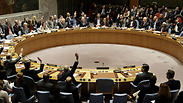
The UN Security Council during the resolution vote
צילום: EPA
WH: US abstention 'absolutely not' attack on Netanyahu
The White House completely rejects accusations that US refusal to veto anti-settlement UN resolution was aimed as a jab at Netanyahu; Arab world rejoices in light of UN admonishment of settlement project.
Friday's UN resolution, which emphatically admonishes the Israeli settlement expansion, has caused Prime Minister Benjamin Netanyahu to wholly reject its position and accuse US President Barack Obama of working behind the scenes to bring it about.
The White House has responded to such accusations that call the move as a personal attack of issued by Obama on Netanyahu, due to the animosity between the two. When asked by CNN reporter Jim Acosta whether this was "President Obama getting back at Prime Minister Netanyahu," White House Deputy National Security Adviser Ben Rhodes said, "absolutely not." He then added, "The fact of the matter is that Bipartisan policy of the US government for decades has been to oppose settlements."
Rhodes was also asked what the White House would reply to those who would say that the US has abandoned Israel, to which he responded that "It’s just not backed up by the record," and that the US has consistently looked out for Israel's interests at the UN. This remained true under President Obama, who earlier this year had passed a $38 billion aid package to Israel, the largest package the US has ever given an ally.
The US's abstention nevertheless marked a drastic change from US policy, which has traditionally struck down any anti-Israeli resolutions. This time, not only did the US not exercise its veto right, but US Ambassador to the UN Samantha Power abstained from the vote. Had the US voted in favor, the resolution would have been unanimously accepted.
The Arab World was also quick to respond to the resolution's passing. Among them was Egypt, whose President Abdel Fattah al-Sisi had previously urged both Israel and the Palestinians to work together through his own peace initiative.
Egypt found itself in water both before and after the Security Council vote: prior to the vote, an Egyptian resolution that would have similarly admonished the settlement project had been pulled, after al-Sisi reportedly had a conversation with US President-elect Donald Trump, who expressed his objection to the proposal. The resolution that was eventually passed was submitted by New Zealand, Senegal, Malaysia and Venezuela, prompting Netanyahu to call back Israeli ambassadors to New Zealand and Senegal, and to cancel Israel's aid package to Senegal.
Following the vote, Egypt received criticism from other Arab countries for withdrawing its own resolution. Egyptian Foreign Ministry Spokesperson Ahmed Abu Zeid responded to allegations from the Arab world by saying that due to the chances that the Egyptian resolution would be vetoed, and considering the Palestinians' insistence to bring the matter before the Security Council immediately, Egypt decided to retract its own resolution proposal. "This, in turn, encouraged other countries to submit a resolution of the same wording of (Egypt's) resolution draft to a vote."
Abu Zeid also referred to Trump's displeasure with Egyptian resolution draft, and his demand to have the current administration veto it. "Since Egypt plays a central role in sponsoring any future negotiations between Israel and the Palestinians, while coordinating with the new US administration, it was important for us to retain the necessary balance to bring about a general and just solution that would allow the return of all Palestinian rights, based on the international community's decisions."
Qatari Foreign Affairs Minister Sheikh Mohammed Bin Abdulrahman congratulated the Security Council for taking a stand against the settlements and expressed hope for "establishing a just and general peace for the Palestinian people." He added that the settlement building "contradicts decisions made by the international community and specifically the Fourth Geneva Convention treaty."
The Saudi delegation to the UN said that "Implementing the decision would be a step toward actualizing the Arab peace initiative."
Secretary-General of the Arab League Ahmed Aboul-Gheit issued a statement, saying that the resolution expresses the international community's support of the Palestinian people's historic struggle to attain their legitimate rights. He added that he hopes the decision will push Israel to become more committed to this and other decisions made by the international community.
The Palestinian Authority also responded, saying that it considers the UN's acceptance of the resolution "a big blow to Israeli policy, a unanimous international condemnation of settlements and a strong support for the two-state solution," a spokesman for Palestinian President Mahmoud Abbas said in a statement published by the official Palestinian news agency Wafa.
"This is a day of victory for international law, a victory for civilized language and negotiation, and a total rejection of extremist forces in Israel," said Chief Palestinian Negotiator Saeb Erekat.
Jordan Government Spokesperson Mohammad Al Momani also responded to the UN resolution, calling it "a historic decision." Al Momani said that it reflected the international community's general consensus view, which considers the Israeli settlements illegal, while also highlighting the Palestinian people's right to its land, while supporting a two-state solution.










